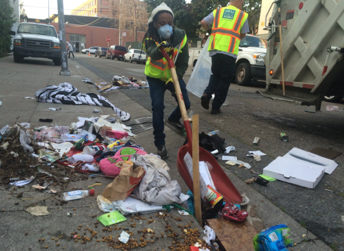Word about Taking out the Trash
Word about Taking out the Trash
Household chores. Cooking, laundry, housecleaning, yard work and all the other tasks it takes to help our lives run smoothly.
Who does which chores, when, how and how often? Who does them willingly or even happily? Who needs to be reminded or even prodded to uphold their end of our chores “agreement”? How do we handle disagreement, hurt or anger when something that needs to be done is not done or not done in a timely manner?
These are just a few of the more consistent triggers of relationship irritations, annoyances and arguments.
(Of course, we understand that the argument is not about the chore itself. Rather it is about what the chore means or represents to each of the parties. Usually, the discussion they need to have is about respect, trust, control or balance in the relationship.)
Taking out the Trash

Frank and his wife were participants in a recent Safe Conversations workshop facilitated by my colleagues and me. (He has given his consent for me to tell you the observations he shared with the group.)
We had just finished the section of the workshop emphasizing affirmations and expressions of gratitude as a means of “re-romanticizing” the relationship. In this exercise, the couple takes turns sharing with the other specific things their partner does that help them feel loved and valued.
Frank’s wife had just told him that it is really helpful to her when he takes out the trash. That is a fairly common expression of love in many relationships.
But wait, there’s more!
He also shared that recently, as he was doing his chore, on the way to the larger garbage can, the trash bag he was carrying broke and spilled its contents all over the driveway creating a huge, smelly mess!
Instead of becoming upset, he paid attention to what had been spilled. He realized that almost all the contents of the trash bag were the result of chores that his wife had done: cleaning the house, vacuuming the carpets, cooking the meals, clearing the table after the meals, emptying the smaller trash cans, etc.
“All I had to do was take out the trash. She had worked much longer and harder creating the trash!”
Wow! What a great observation! It is one that I had never considered.
There is always another perspective from our own. Usually, the more we focus on understanding the perspective of our partner, instead of insisting that they understand ours, the better we are individually and in our relationships.
Categories
- A Word About
- Abuse
- Anger Management
- Anxiety
- Breast Cancer
- children
- Conflict
- Depression
- Disaster Recovery
- Divorce
- Dr. Harold Duncan
- Dr. Terri Gonzales
- Emotional Intelligence
- Grief
- Healthy Sexuality
- Index
- Katrina Giries
- Marriage
- News
- Parenting
- Photo
- Practice Update
- Safe Conversations
- Skype Counseling Sessions
- Stress
- The Meadows Series
- Uncategorized

Leave a Comment